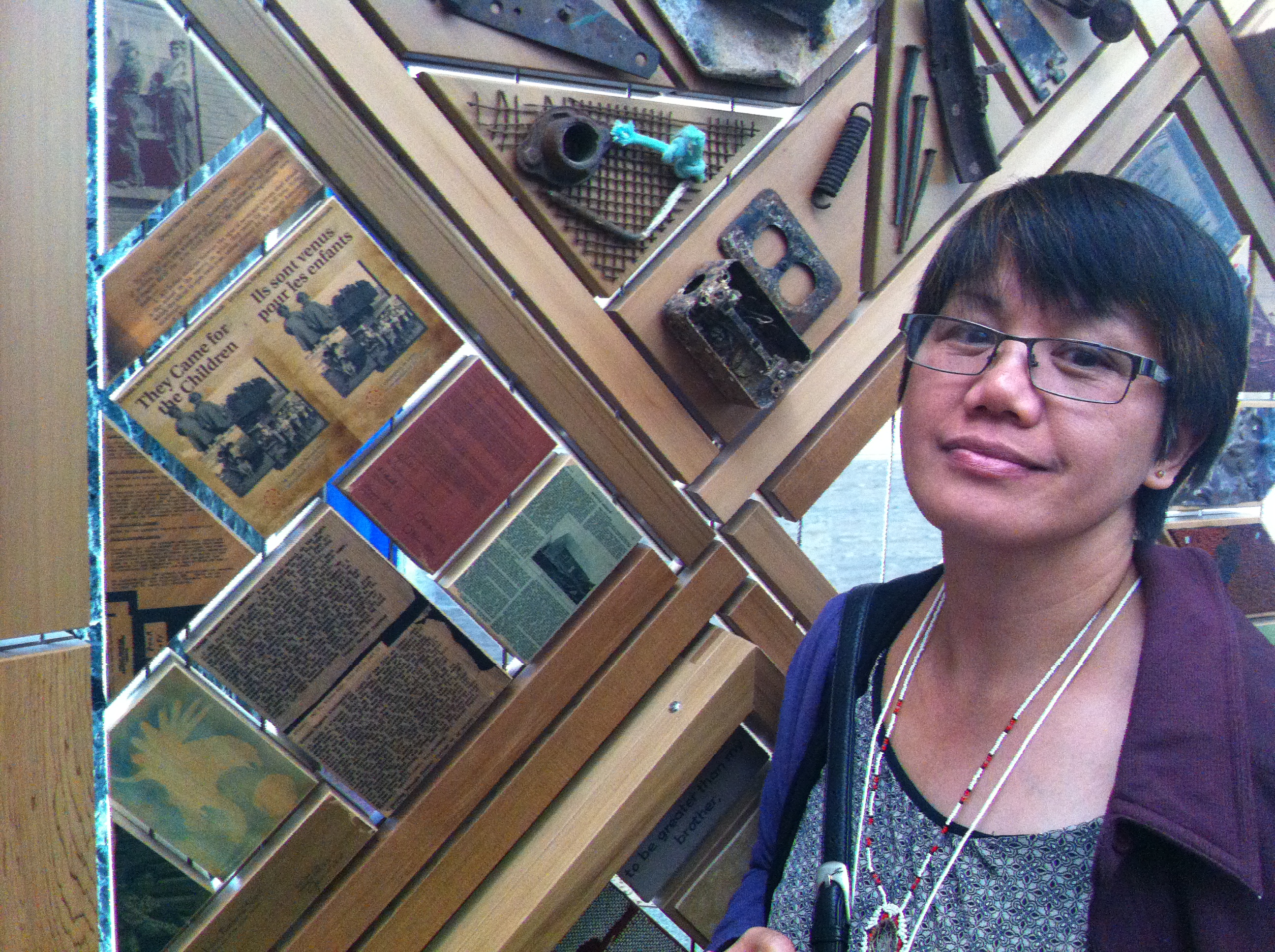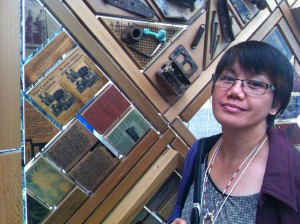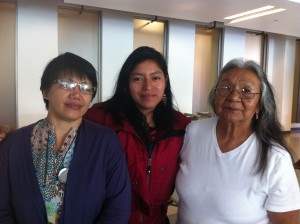Reflection on the TRC: Canada MUST make reconciliation happen with the same bravery and trust as that shown by survivors and witnesses


Vernie Diano beside the Witness Blanket, a National Monument to recognize the atrocities of Indian Residential Schools
By Vernie Diano
During the mass blanket exercise hosted by KAIROS on the grounds of Parliament Hill, I was impressed that it was young people playing the drums, an important cultural tradition of Indigenous peoples in Canada. They sang while they played and danced in a circle. It seemed that in playing the drums these young people learned who they are, their history. Pain has been part of the history of Canada’s Indigenous peoples as a result of the residential school system used by European colonizers to separate children from their parents and wipe out the identity of Aboriginal children. Indeed, the residential schools system was a systematic act of cultural genocide as the Truth and Reconciliation Commission put it in its final report released on 2 June 2015.
Playing the drums is also healing. I saw how the young people who played them cried and embraced each other. On the other hand, I saw how the drums brought the people together in a dance and circle. Eventually, the circle got bigger with Aboriginal and non-Aboriginal people coming in.
Being an international witness to the final event of the Truth and Reconciliation Commission was indeed an honor and enlightening. As an Indigenous person in the Cordillera, Philippines who travelled for this event, I heard similar stories in which the cross and the sword were used to colonize a people. When I heard stories of pain and even death from survivors and their families, brought about by physical, mental, verbal and sexual abuses experienced in residential schools, I imagined similar kinds of abuses used by Spanish colonizers to subjugate the “savage natives and pagans” in their more than 300 years of rule in the Philippines. The succeeding American colonizers in the Philippines were more successful in penetrating the territories and culture of Indigenous peoples in the Cordillera region and other indigenous territories in the country using schools run by missionaries to educate the “savages and pagans.” The treatment may not be as harsh as that found in Canada’s residential school system but just the same, the schools were used to bring in a colonial mindset thought to be superior to the traditional way of life and to isolate or eliminate the life systems and integrity of the native peoples.
Amid the pain of the TRC testimony, I saw the strong desire for reconciliation that is based on the truth and based on justice and transformation. As Commission Chair Justice Murray Sinclair said, “reconciliation is not an Aboriginal problem, it is a Canadian problem.” Former Prime Minister and TRC Honorary Witness Joe Clark underscored that the apology is part of treating the damage. As a witness from overseas and who has witnessed the TRC with KAIROS many times, I have heard in testimonies and messages from survivors at the Montreal National Event in 2013 and in the Ottawa final TRC, that the residential school system had a tremendous impact on Aboriginal peoples. It is recognized as a significant part of Aboriginal history however, it needs to be recognized also as part of Canada’s history.
It is a sad story of colonization. And so it is impressive to note that both Aboriginal peoples and non-Aboriginal Canadians have come together and continue to come together to speak about the genocidal impact of the residential school system, decolonization, and reconciliation based on truth and justice. I believe that decolonization starts from our own hearts and minds, but more importantly and seriously decolonization has to be done institutionally— in the education system, churches, media, laws and judiciary, and government. Ellen Gabriel, an activist from the Kanehsatà:ke Mohawk community in Quebec , calls for the need for system change. Decolonizing institutions requires forging the energies and solidarity of Indigenous and non-Indigenous peoples in a movement to make Canadians and the world aware of the problems and inequalities faced by Indigenous peoples in Canada. National Indigenous Anglican Bishop Mark MacDonald describes reconciliation as a process of transformation where the oppressor and those who were complicit realize they committed a mistake.
The announcement of the TRC’s findings and recommendations was an historic and moving moment. There was cheering and hope. Without the survivors’ courage this momentous and historical moment could not have happened.
The work is not over. Another journey to realize the recommendations has yet to happen—ending the legacy of discrimination, implementing of the UN Declaration on the Rights of Indigenous Peoples, re-establishing treaty relations, changing the delivery of child welfare, and many, many others. There was a moving roar in the audience upon the recommendation to establish an Inquiry into missing and murdered Indigenous women.
I will watch with the rest how the Canadian nation and government take on these recommendations as a state that respects, protects and fulfills human rights. Canada MUST make reconciliation happen with the same bravery and trust as that shown by survivors and witnesses. As I look to a future of reconciliation, I am hoping that a new window has been opened in building solidarity between Indigenous peoples’ movements in the global South, like the Philippines (e.g. Innabuyog, Cordillera Peoples Alliance), and Indigenous peoples in Canada.
Let us keep the sacred fire burning in every heart as we aim to live out transformation and reconciliation. Let us use the seven words that Commissioner Wilton Littlechild reminded us about in achieving reconciliation—I am sorry; I love you; Thank you.




